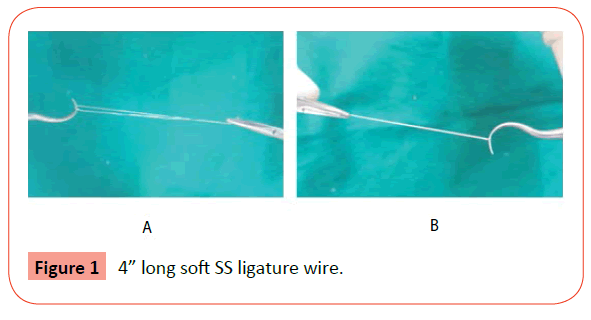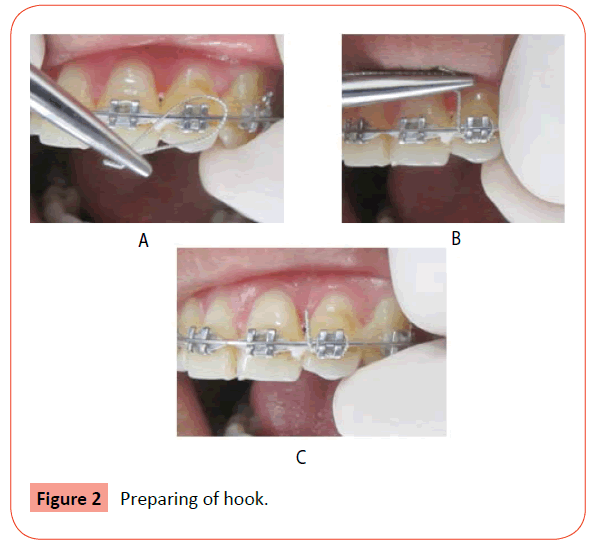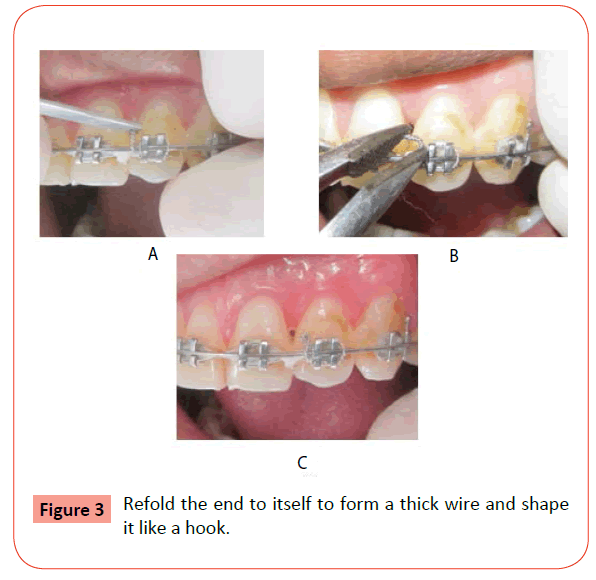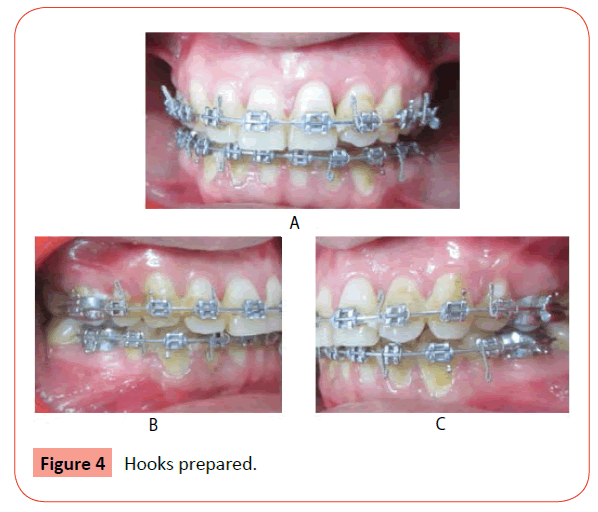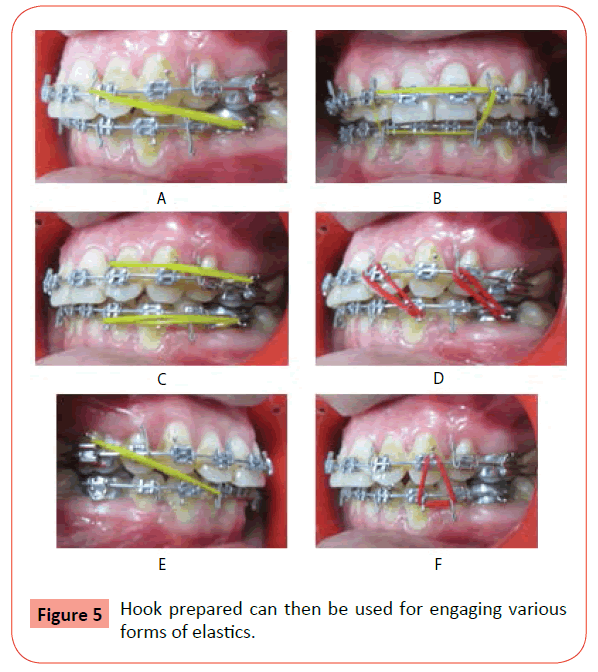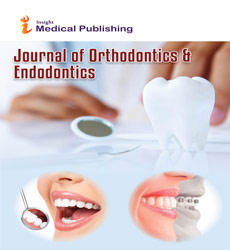Customized Ligature Hook: A Noble Approach for Engaging Elastic in Fixed Orthodontics
Atri Naik, Abhishek Bansal, Naindra Tandel and Sugnesh Patel
DOI10.21767/2469-2980.100033
Department of Orthodontics, Vaidik Dental College and Research Center, Daman and Diu, India
- Corresponding Author:
- Abhishek Bansal
Senior lecturer, Department of Orthodontics, Vaidik Dental College and Research Center, Nani Daman-396210, Daman and Diu, India
Tel: +91-9844243394
E-mail: ashi142002@yahoo.co.in
Received Date: October 29, 2016; Accepted Date: November 21, 2016; Published Date: November 25, 2016
Citation: Naik A, Bansal A, Tandel N, et al. Customized Ligature Hook: A Noble Approach for Engaging Elastic in Fixed Orthodontics. J Orthod Endod. 2016, 2:4. doi: 10.4172/2469-2980.100033
Copyright: © 2016 Abhishek Bansal, et al. This is an open-access article distributed under the terms of the Creative Commons Attribution License, which permits unrestricted use, distribution, and reproduction in any medium, provided the original author and source are credited.
Keywords
Brackets; Ligature hook; Crimpable hooks
Introduction
Orthodontic brackets with hooks are required to engage active components like elastics. However, few brackets especially of Incisors and Premolar are usually devoid of hooks. Therefore in cases where various elastic forms (e.g., Class I, Class II, Class III, Vertical elastics, Cross elastics, Box elastics, Triangular elastics, Settling elastics, etc.) [1-4] are indicated, the use of formed hooks, crimpable hooks, kobayashi hooks, etc. are mandatory [5-7]. These hooks are commercially available which adds to the cost of Orthodontic treatment.
Few methods of attaching hooks are also available in literature which carry certain demerits like time consumption, cost effectiveness, complex wire bendings, debonding of brackets while attachment of hooks etc. [8-10].
Thereby, to reduce the added cost and inventory, and to simplify the procedure, we introduced Customized Ligature hook, which is a noble, easy and user friendly customised hook that can be used for the above mentioned purpose.
Materials Required
1. 0.010” Soft Stainless steel ligature wire.
2. Mathews’ pliers.
3. Explorer.
4. Wein guard pliers.
5. Tucker.
Method of Formation of Customised Ligature Hook
Steps involved in the formation of the hook are as follows:
1. Take a 4” long soft SS ligature wire, and double fold it by twisting the two legs of ligature wire around each other to form a braided wire which increases stiffness of wire (Figures 1A and 1B).
2. Use this braided ligature wire to ligate the tooth on which the elastics are to be engaged leaving the long ends of wire intact which will be used to prepare hook (Figures 2A-2C).
3. Using tucker and wienguard pliers, refold the end to itself to form a thick wire and shape it like a hook. This refold is to ensure that sharp ends do not impinge on patient’s mucosa (Figures 3A-3C).
4. Hooks prepared on the tooth as indicated (Figures 4A-4C).
5. This hook can then be used for engaging various forms of elastics (Figures 5A-5F).
Uses
It can be used to engage following forms of elastics as and when required:
1. Class I, Class II, Class III elastics.
2. Vertical elastics.
3. Cross elastics.
4. Box elastics.
5. Triangular elastics.
6. Settling elastics etc.
Advantages
1. Easy, economical and time saving.
2. Prepared customised as and when required.
3. Good maintenance of oral hygiene.
4. Less irritant to gingival tissues.
5. The hooks can be occlusally placed in indicated cases.
6. Can withstand heavy forces which kobayashi hooks cannot.
References
- William RP, Fields H, Sarver D (2007) Contemporary Orthodontics (4thedn.) Mosby Elsevier Publications.
- Graber TM, Robert LV, Katherine WL (2000)Orthodontics:Current principles and techniques(4thedn.) Elsevier Mosby Publications.
- Robert EM (1988) Handbook of orthodontics (4thedn.) Year book medical publishers, Inc.
- Samir EB (1993) Textbook of Orthodonitcs (2ndedn.) WB Saunders Company.
- Yadav S, Upadhyay M (2007) Custom-made ligature hooks for engaging elastics. J ClinOrthod 41:39-40.
- Verma RK, Jena AK, Singh SP, Utreja AK (2012) Sturdy hooks for elastics attachment. J ClinOrthod 46:572.
- Siddharth SR, Ameet VR, Vikram P, Sangamesh F, NeerajG (2014) Multipurpose hooks for elastic attachment. APOS Trend Orthod 4: 45-47.
- Rajesh D, Kumar R, Kiran H (2011) Template for soldering retraction hooks on archwires. J IndOrthodSoc 45: 98-100.
- Sanjeeb KS, Snigdha P, Smruti BN (2014) Easy ligature Hooks on Archwire. J IndOrthodSoc 48: 431-432.
- Raghu RR, Sivakumar A, MdAzharuddin, Anoosha M, Siddhartha N (2014) Custom Made Vertical Pins (I-Pins): An Alternative to T-Pins. J IndOrthodSoc 48:433-434.
Open Access Journals
- Aquaculture & Veterinary Science
- Chemistry & Chemical Sciences
- Clinical Sciences
- Engineering
- General Science
- Genetics & Molecular Biology
- Health Care & Nursing
- Immunology & Microbiology
- Materials Science
- Mathematics & Physics
- Medical Sciences
- Neurology & Psychiatry
- Oncology & Cancer Science
- Pharmaceutical Sciences
